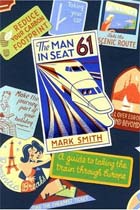Kill several birds with one stone
There are regular stories of the most overcrowded trains in the country, often times focusing on the largest market, which of course is commuter traffic in London and the South-East. Yesterday, it emerged that the top ten most overcrowded trains in the London & South-East sector all originate from Paddington and are operated by First Great Western. While one of them (the 06:30 Bristol Temple Meads to London Paddington) is a long distance commuter service that uses the converted high-capacity Intercity 125, most of these are run with FGW’s fleet of diesel powered Networker units, which are 2 and 3 cars in length. Of course, you will get peak time trains that are coupled together but even then the majority will be formed into no more than six car trains. Compare this with some of London’s other commuter operators that almost as standard tend to run trains that are 8 cars in length as a minimum during peaks. This got me thinking.
Events, as is often the case, have overtaken things. The meltdown of the eurozone and downgrading of the United States’ credit rating, together with the riots over the last week, have seen Bombardier and the Thameslink rolling stock procurement virtually bumped from the news altogether – we’ve seen small stories of Derby County giving their backing, while for the first time in some time there was an irate letter in the Daily Express. Of course, there is nothing emanating from the Government about any thought of changing their minds about offering the contract to Siemens, but you wouldn’t expect there to be. This has also got me thinking.
I mentioned a while ago some ideas that I’d come up with off the top of my head about what could be done in terms of new orders that could be awarded to Bombardier without withdrawing the Thameslink contract from Siemens (that could potentially lead to legal action), and one of the things I suggested, whch Nigel Harris also came up with, was to bring forward the Pacer replacement to start work now, rather than waiting until the last minute. This idea could be tied in with the idea of improving capacity on FGW’s routes out of Paddington by revisiting the Diesel Trains Ltd concept.
For those that may not remember, back in around 2008, when the previous government started making noises about purchasing 1300 new rail vehicles, it was announced that 200 or so would be brand new DMUs that would be distributed to various TOCs (including FGW) for capacity enhancements. As it turned out, when Lord A announced the electrification plans for the GWML and the north-west, it was decided not to buy any more new diesel units, as electrification would make their long term value questionable (or so it was thought). And it is certainly true that once Crossrail opens, capacity on the Thames Valley corridor will significantly improve. But Crossrail doesn’t open for the better part of another decade. So why not do something about it now? Go back to the DMU proposal and build them to enable longer trains to be run on the commuter routes out of Paddington. Once the electrification of the GWML is complete and the cascade of Class 319s from the Thameslink route takes place, these DMUs can themselves be cascaded to replace the existing Pacers (the Networker trains are built to a slightly bigger loading gauge than normal to take account of the greater amount of space on the GW, and so would be difficult to cascade). This then kills not two, but three birds with one stone:
- Overcrowding on the routes into Paddington is reduced in the short-medium term until Crossrail opens.
- A Pacer replacement is in service and tested ready to be transferred.
- Bombardier (because the obvious choice for any such project would be the Class 172) gain a significant new order that enables production to continue until (hopefully) it is awarded the Crossrail contract.
And if the DfT have any objection to this, then the ROSCOs should tell them to go fuck themselves; indeed, imagine what a good position any new Great Western franchise bidder would be in if they said “we’ll buy 200 extra vehicles ourselves if we get the franchise”. Is that a winner do you think?
“London Paddington station worst for overcrowded trains”
“Invitation to tender issued for 200 new diesel train carriages”













Lets get this quite clear – ROSCO’s wont buy more DMU’S because they risk being left with trains they cant lease because electrification has cascaded cheaper, older trains – sprinters have many decades left in them. The same economics would apply to DfT owned trains. What we need is electrification, not short term policies to prop up a factory which Bombardier has shown little interest in, leaving us out of pocket.
Sprinters may have many decades left in them, but are there enough of them to cascade to replace the Pacers when they themselves are replaced following electrification? It’s all very well saying we need electrification, and I agree. But you’ll never electrify the entire network; there will always be a need for self-powered vehicles. Can you guarantee there will be enough of those, with sufficient life in them, that meet the coming legal requirements that Pacers don’t meet, without new build?
I’d be surprised if there wasnt a shortfall, but further electrification should mean remaining Pacer’s can be relegated to providing peak capacity coupled to units which do meet the DDA regulations. Not a pretty solution, but rail investment shouldnt be governed by short term issues such as propping up Derby or eliminating Pacer’s a few years earlier; just look at how we scoff at steam loco’s being scrapped after 6 years!
I agree that investment should not be done as short-termism, but to suggest that “propping up Derby” would be short termism I think is a short-sighted view. The reason Bombardier finds itself in the situation it does is precisely because of the short-termism of rail investment up to now. In any case, isn’t trying to ensure the safeguarding of not just the 3,000 odd strong workforce at Litchurch Lane, but also the thousands of jobs at companies in Bombardier’s supply chain important?
If Bombardier had invested in its UK business in the same way that Siemens had invested in its European business, we wouldnt be in this position. Its quite shocking how little they’ve invested in development, the Turbostar and Electrostar have barely changed but neither has reliability imprved because of the abysmal way they treat their supply chain. They cant secure an ongoing supply of the same components, they cock up the testing of the changes they do make, they *still* cant make a generic unit like the 379 without the endless door and computer problems they’ve surely solved elsewhere – its just horrendous.
Listen to the people working on them, and you’ll hear the same thing – their designs are really maintenance unfriendly compared to Desiro’s, even units in the same fleet *built at the same time* have different components. Its just not good enough.
Dont forget either, where’s the legal action over the IEP tendering process? Why dont they build speculative units? What about building a prototype of a ‘Operation Thor’? There’s precious little innovation or initiative in the business, so the obvious conclusion is that they just arent that committed long term.
I hope you agree that the idea that Derby should be given Crossrail is insane – two fleets with near identical specs, dual voltage, three different signalling systems and tube-like dwell times. The idea of making that work once is daunting, why you’d want to do it twice is beggars belief….
I liked your article is an interesting technology
thanks to google I found you